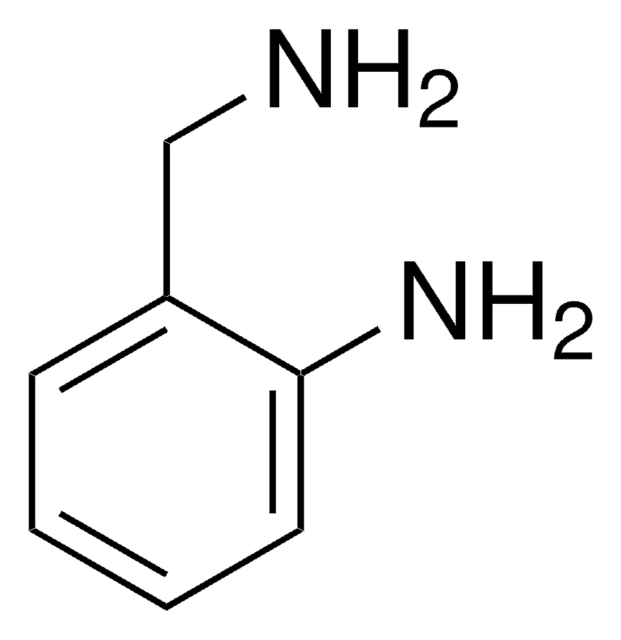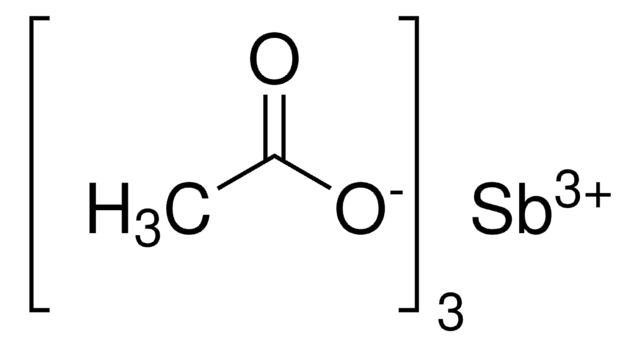202649
Antimony(III) oxide
99.999% trace metals basis
Synonym(s):
Diantimony trioxide
Sign Into View Organizational & Contract Pricing
All Photos(1)
About This Item
Linear Formula:
Sb2O3
CAS Number:
Molecular Weight:
291.52
EC Number:
MDL number:
UNSPSC Code:
12352303
eCl@ss:
38080202
PubChem Substance ID:
NACRES:
NA.23
Recommended Products
Quality Level
Assay
99.999% trace metals basis
form
powder
bp
1550 °C (lit.)
mp
655 °C (lit.)
SMILES string
O=[Sb]O[Sb]=O
InChI
1S/3O.2Sb
InChI key
ADCOVFLJGNWWNZ-UHFFFAOYSA-N
Looking for similar products? Visit Product Comparison Guide
Related Categories
Application
Selective ammoxidation catalysts for such reactions as conversion of toluene to benzonitrile or propylene to acrylonitrile were prepared by a sol-gel method from V2O5, Sb2O3 and high purity hydrogen peroxide.
Features and Benefits
Useful component of new materials. J. Am. Ceram. Soc. 1995, 78, 1179. J. Mater. Chem. 1995, 5, 75.
Signal Word
Warning
Hazard Statements
Precautionary Statements
Hazard Classifications
Carc. 2
Storage Class Code
13 - Non Combustible Solids
WGK
WGK 1
Flash Point(F)
Not applicable
Flash Point(C)
Not applicable
Certificates of Analysis (COA)
Search for Certificates of Analysis (COA) by entering the products Lot/Batch Number. Lot and Batch Numbers can be found on a product’s label following the words ‘Lot’ or ‘Batch’.
Already Own This Product?
Find documentation for the products that you have recently purchased in the Document Library.
Customers Also Viewed
Nona Merry M Mitan et al.
Chemosphere, 72(7), 1073-1079 (2008-05-24)
The controlled pyrolysis of polyethylene/polypropylene/polystyrene mixed with brominated high-impact polystyrene containing decabromodiphenyl ether as a brominated flame-retardant with antimony trioxide as a synergist was performed. The effect of decabromodiphenyl ether and antimony trioxide on the formation of its congeners and
P E Newton et al.
Fundamental and applied toxicology : official journal of the Society of Toxicology, 22(4), 561-576 (1994-05-01)
Fischer 344 rats were exposed by inhalation to Sb2O3 (antimony trioxide) dust at exposure levels of 0, 0.25, 1.08, 4.92, and 23.46 mg/m3 for 6 hr/day, 5 days/week for 13 weeks followed by a 27-week observation period. Subsequently, an inhalation
David Kirkland et al.
Mutation research, 627(2), 119-128 (2006-12-19)
Antimony trioxide (Sb2O3, CAS 1309-64-4) is widely used as a flame retardant synergist in a number of household products, as a fining agent in glass manufacture, and as a catalyst in the manufacture of various types of polyester plastics. It
Lisa Bregoli et al.
Toxicology, 262(2), 121-129 (2009-06-02)
Nanoparticles (NPs) are materials with one dimension in the range of 1-100 nm. The toxicity of NPs remains widely unknown and still poses concerns, due to the peculiar characteristics of materials in the nano-size range. We analyze the toxicity of
Koen Oorts et al.
Environmental science & technology, 42(12), 4378-4383 (2008-07-09)
Antimony trioxide (Sb2O3) is a widely used chemical that can be emitted to soil. The fate and toxicity of this poorly soluble compound in soil is insufficiently known. A silt-loam soil (pH 7.0, background 0.005 mmol Sb kg(-1)) was amended
Our team of scientists has experience in all areas of research including Life Science, Material Science, Chemical Synthesis, Chromatography, Analytical and many others.
Contact Technical Service










